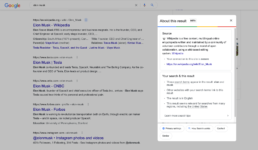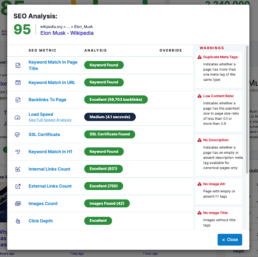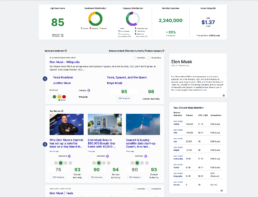Probably not, but it will help you understand them. For everything else, there’s Lightbox Search.
August 9, 2021
Google recently released a new feature that gives searchers a high-level overview that explains why a specific result appeared for your query.
Currently still in beta, “About this result” information is accessible via the three small dots located to the right of every search result’s URL. Clicking on the dots opens a pop-up window that gives insight into which ranking factors contributed to that web page’s search engine visibility.
Although the data isn’t detailed enough to help digital experts optimize content and improve rankings, it is an important step forward toward providing transparency into how Google crafts search engine results pages (SERPs) and presents the online profiles for businesses and individuals alike.
Here’s what it looks like for Elon Musk’s Wikipedia page:

While the feature is still in its infancy, we do know it includes summary information on matching keywords, related terms, backlinks, and local relevance.
- Matching keywords: Google looks for matching keywords to determine if information on a webpage is relevant to your search.
- Related terms: Google seeks synonyms and related keywords and search terms that have the same or similar meaning to your search when selecting content to display in response to a query.
- Backlinks: Google will examine backlinks to your content to determine if there are similar words to your search terms and phrases. When other pages link back to a page using similar words as your query, that page might be relevant to your search.
- Local relevance: Google considers factors like the language you use to search as well as your country and location to localize results and deliver content relevant to your area.
Why should you care about Google's new feature?
Because the content you’re already making can be optimized for search using words – not just data and code. Until now, Google has been pretty tight-lipped about its ranking algorithms, leaving those in SEO or marketing curious and hungry for more information. With this new feature, Google is shining some light onto their process, confirming a few long-held hunches and theories as facts.
“About this result” information makes it clear that building a powerful online presence begins with crafting the right content and using the most effective keywords. This is something every communicator is equipped to do in one form or another: blogging, writing and issuing news releases, website development, claiming and populating social media channels and other online profiles. The list of opportunities is near endless.
Lightbox takes this concept farther. Much farther.
As we explained, Google’s information is superficial, intending to help searchers understand a little more about how Google operates. It’s not going to help you optimize content or identify new opportunities to generate traffic and leads.
Fortunately, that’s exactly why Lightbox Search was developed: to help users understand why search results appear in the order and ranking they do – but with full transparency – like a medical MRI for search results – enabling users to take action for their clients and brands. Every search run on Lightbox is overlaid with valuable information that helps users plot both paid and organic communications strategies and manage search results.
For comparison, check out our version of Google’s “About this result” for Elon’s wiki page.

But wait - there’s more!
Beyond SEO strength, Lightbox automatically analyzes SERPs and results from all conceivable angles and presents a color-coded dashboard that’s easy to navigate.

- Sentiment: Lightbox Search utilizes the same A.I. technology found in monitoring services like Cision or Meltwater to analyzes search results for sentiment. Unlike those firms and others, Lightbox Search can be overridden and customized by every user for 100% accuracy in any context. For instance, what A.I. will often flag a pharmaceutical news release announcing a breakthrough into diagnosis of a disease as negative due to the overall content of the page. With Lightbox, you or your team can correct such errors easily for more accurate monitoring.
- Category: Every result is assessed and assigned a category that helps users clearly understand its “category type,” such as website, news release, news or business service listing, using familiar terminology.
- Domain Strength: To make clear the relative strength of every website competing for visibility on a page, Lightbox reveals every result’s domain authority, streamed straight from the company that created the concept, Moz.
- Page-level SEO: Lightbox Search scans every result for 10 critical data-points and 34 potential problems like mobile load speed and broken links. Lightbox Search translates this complex data into clear and concise insights. With just a search and a click, you can access a full-analysis of any search result, like the one for Elon’s wiki shown above.
To learn more about how Lightbox Search can help you understand and take control of search results, schedule a demo today.
Written By
Fiona Doull
Content Manager
Fiona creates content for Lightbox Search’s social media platforms as well as assists in writing original content and working with clients. Fiona graduated Magna Cum Laude from Quinnipiac University and holds a Bachelor of Arts degree in both Public Relations and Media.
Keep Reading
January 28, 2025
The Power of Search: How Google Fuels Gen AI and Why Online Presence Matters, even to DeepSeek
Search results ain’t what they used to…
October 17, 2024
The AI Takeover of Search: There’s a New Playbook
Search results ain’t what they used to…
March 25, 2024
Can Boeing’s Online Reputation Re-Gain Altitude?
Air travel sure ain’t what it used to…


